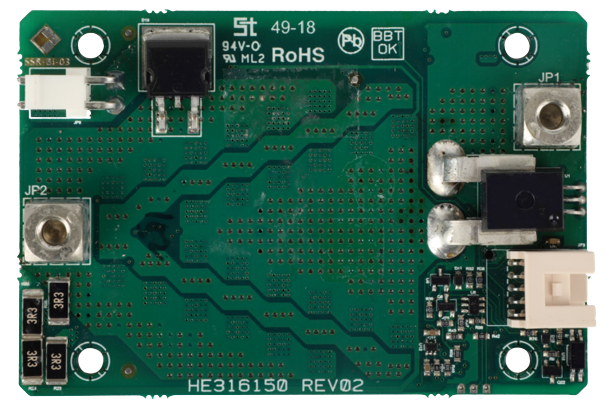GPS TRACKER
GPS TRACKER
Revolutionize your tracking experience with our GPS Tracker. This state-of-the-art device seamlessly integrates with the Internet of Things, providing unparalleled accuracy in location tracking. Visualize real-time device locations on a dynamic map through an intuitive dashboard, offering comprehensive insights into movements and historical routes. Customizable alerts, geofencing, and multi-device management enhance security and efficiency. With secure data encryption and a user-friendly interface, this GPS Tracker is your gateway to proactive monitoring, streamlined operations, and peace of mind. Upgrade to a smarter, more connected tracking solution today.
Features of GPS Tracker
- Precision Tracking
- Interactive Map Display
- IoT Integration
- Multi Device Management
- Historical Route Review
- Geofencing Technology(Coming Soon!)
Choosing The right technology
Dominated for many years by lithium-ion polymer technology due to its high energy density, we have increasingly directed our customers towards drone batteries based on cylindrical lithium-ion cells. Despite a lower energy density, lithium-ion cylindrical cells offer many advantages over lithium-ion polymer.
Should you add a BMS or not to reduce weight? Can we consider other protective solutions? Lithium-ion polymer or lithium-ion cylindrical cells? High current? High energy density? Mechanical parts in carbon, specific ABS, tropicalised varnish, dedicated BMS features, communication in CAN or CAN open?
Please do not hesitate to get in touch with our application engineers, we will be happy to answer these questions along with any others.

Frequently Asked Question
As drones become increasingly popular for both recreational and commercial purposes, the demand for longer flight times and more powerful batteries is on the rise. Lithium-ion batteries have become the go-to solution for powering drones, offering a high energy density, low weight, and long cycle life. However, not all drone batteries are created equal, and off-the-shelf options may not always meet the needs of all drone users. That's where custom drone Li-ion batteries come in.
Custom drone Li-ion batteries are designed to meet the specific needs of individual drone operators, taking into account factors such as the type of drone, the intended use, and desired flight time. These batteries are built to the exact specifications required by the drone, resulting in better performance and longer flight times. Here are some of the advantages of using custom drone Li-ion batteries:
1. Longer Flight Times: One of the biggest advantages of custom drone Li-ion batteries is the ability to extend flight times. By optimizing the battery's capacity and voltage for the specific drone model, custom batteries can provide longer flight times than off-the-shelf batteries.
2. Enhanced Performance: Custom drone batteries can be designed to deliver the specific power requirements of a drone, resulting in improved performance. For example, batteries can be built to handle higher discharge rates, enabling faster acceleration and higher speeds.
3. Better Efficiency: Custom drone batteries can also be designed to improve overall efficiency. By using high-quality components and advanced management systems, custom batteries can reduce energy waste and ensure that every drop of power is utilized efficiently.
4. Increased Safety: Safety is always a top concern when it comes to Li-ion batteries. Custom drone batteries can be built with safety features such as thermal management systems, overcharge protection, and short circuit protection, ensuring safe and reliable operation.
5. Cost-Effective: While custom drone batteries may seem like an expensive option, they can actually be more cost-effective in the long run. By optimizing the battery for the specific drone and intended use, custom batteries can reduce the risk of damage or failure, ultimately saving money on repairs and replacements.
In conclusion, custom drone Li-ion batteries offer a wide range of benefits for drone operators, including longer flight times, improved performance, better efficiency, increased safety, and cost-effectiveness. If you're looking to maximize the potential of your drone, consider investing in a custom Li-ion battery solution that is tailored to your specific needs. With the right battery, you can take your drone to new heights and achieve better results than ever before.
One of the most crucial parts of your drone's operation is its battery, and taking good care of it can help it last longer and continue to work well.
The following advice will help you make the most of your drone battery:
1. Charge your battery before it runs completely flat: Maintaining a fully charged battery will provide maximum performance and longevity.
Never allow the battery totally discharge before recharging it since this can harm the battery cells.
2. Carefully store your battery: While you're not using your drone, it's crucial to keep the battery in a cool, dry location away from heat sources and direct sunlight.
When your drone is not in use, avoid keeping the battery in it for long periods of time.
3. Prevent overcharging the battery: Overcharging the battery can harm the cells and shorten the battery's lifespan in general.
Use a charger that is intended for the particular battery type and model you are using.
4. Follow the manufacturer's guidelines: To maintain the maximum performance and longevity for your drone battery, always adhere to the manufacturer's directions for charging, storing, and use.
The optimum performance and longevity of your drone battery depend on proper charging and storage.
Here are some pointers to help you properly charge and store your drone battery:
1. Use the right charger: Be sure to use a charger that is made for the particular type and model of drone battery you are using.
The battery cells may become damaged if the incorrect charger is used, which may shorten the battery's overall life.
2. Charge at the proper pace. Overcharging or undercharging a battery can result in damage and shorten the battery's lifespan. Always follow the manufacturer's directions for charging time and rate.
3. Avoid overcharging or over-discharging: Overcharging or over-discharging the battery can cause damage to the cells and reduce the overall lifespan of the battery. Use a BMS or other monitoring device to prevent overcharging or over-discharging.
4. Store in a cool, dry place: When not in use, store your drone battery in a cool, dry place away from direct sunlight or heat sources. Avoid storing the battery in your drone for extended periods of time.
By following these tips, you can help ensure the best performance and longevity for your drone battery. Taking care to charge and store your battery correctly can also help ensure the safety and reliability of your drone during operation.
There are several types of batteries available for drones, each with its own advantages and disadvantages. Here's an overview of the most common types of drone batteries:
1. Lithium-polymer (LiPo) batteries: These batteries are the most common type used in drones due to their high energy density, low weight, and long cycle life. They are also highly responsive and can deliver a lot of power quickly.
2. Lithium-ion (Li-ion) batteries: Similar to LiPo batteries, Li-ion batteries offer high energy density and low weight. However, they are less responsive and can't deliver power as quickly as LiPo batteries.
3. Nickel-metal hydride (NiMH) batteries: Because to their lower energy density and bigger size and weight, these batteries are less frequently used in drones.
They are less harmful to the environment than LiPo and Li-ion batteries, nevertheless.
4. Nickel-cadmium (NiCd) batteries: Because to their low energy density, high weight, and short cycle life, these batteries are also less prevalent for drones.
They are also less eco-friendly than other kinds of batteries.
By understanding the different types of drone batteries available, you can choose the best battery for your specific drone and usage needs.
The temperature has a significant impact on how well your drone battery performs and how long it lasts. When exposed to high temperatures, the battery can degrade faster, while low temperatures can reduce its capacity and power output. To ensure that your drone battery delivers optimal performance and lasts longer, it's crucial to be mindful of the temperature and take steps to safeguard the battery from extreme temperature variations.
When using your drone in hot weather, give the battery sufficient time to cool down between flights and avoid storing it in areas with direct sunlight or heat sources. Conversely, if you're flying your drone in chilly weather, try to keep the battery warm by storing it in an insulated case or warming it up before using it. By managing the temperature of your drone battery properly, you can ensure that it performs at its best and lasts as long as possible.
Battery management systems (BMS) play a crucial role in many drone batteries as they help regulate and supervise the battery's charging and discharging to guarantee safe and efficient operation. Typically, a BMS comprises a microcontroller, sensors, and software that work together to manage critical parameters such as the battery's voltage, current, temperature, and more.
One of the primary functions of a BMS is to prevent the battery from overcharging or over-discharging, both of which can damage the battery cells and shorten its overall lifespan. The BMS also helps balance the charge between individual cells within the battery pack, which can enhance the battery's performance and lifespan.
When selecting a custom drone battery, it's essential to make sure that it includes a high-quality BMS that meets your specific needs and usage requirements. A reliable BMS can ensure the safe and efficient operation of your drone battery and maximize its lifespan and performance.
When choosing a custom drone battery, there are several factors to consider to ensure that you select a battery that meets your specific needs and usage requirements. Here are some key factors to consider:
When choosing a custom drone battery, there are several factors to consider to ensure that you select a battery that meets your specific needs and usage requirements. Here are some key factors to consider:
1.Capacity: The capacity of the battery is a key factor in determining how long your drone can remain in flight on a single charge. Consider your flight time needs and pick a battery with sufficient capacity to meet them.
2.Weight: The weight of the battery can affect your drone's flight performance and stability. When selecting a battery, think about how its weight will impact the overall weight and balance of your drone.
3.Voltage and Current: The voltage and current of the battery are critical in determining your drone's power output. Make sure to assess your drone's power requirements and select a battery with a voltage and current that matches your needs.
4.BMS and Safety Features: A top-quality battery management system (BMS) and other safety features, such as overcharge and over-discharge protection, are vital in ensuring the safe and efficient operation of your drone.
5.Compatibility: Ensure that the battery you choose is compatible with your specific drone model and can be effortlessly installed and removed.
While stock batteries that come with your drone can be a convenient option, there are many benefits to choosing a custom drone battery that is designed specifically for your needs. Here are some of the key benefits of custom drone batteries:
1. Higher performance: Custom drone batteries can be designed to have higher energy density, power output, and flight time than stock batteries.
2. Better compatibility: Custom drone batteries are designed to be compatible with your specific drone model, ensuring a perfect fit and maximum performance.
3. Improved safety features: Custom drone batteries can include advanced safety features, such as overcharge and over-discharge protection, to help ensure safe and efficient operation.
4. Longer lifespan: Custom drone batteries can be designed to have a longer lifespan than stock batteries, reducing the need for frequent battery replacements.
5. Better value: While custom drone batteries may have a higher upfront cost than stock batteries, their higher performance and longer lifespan can provide better value over time.

